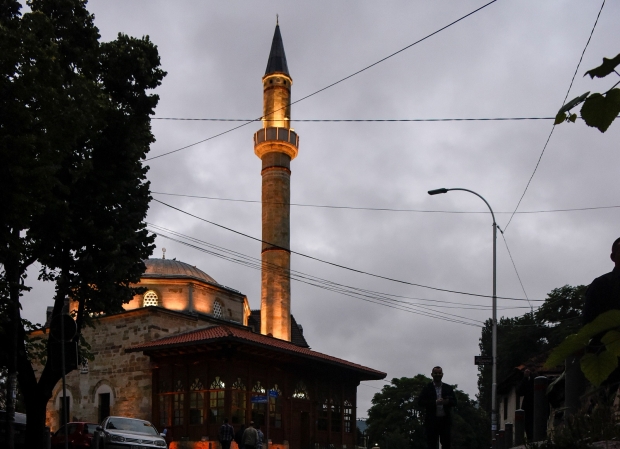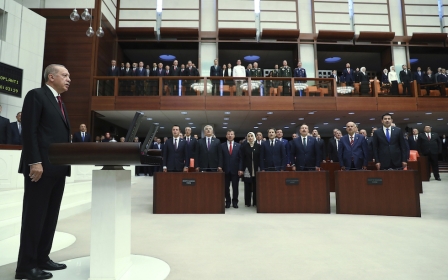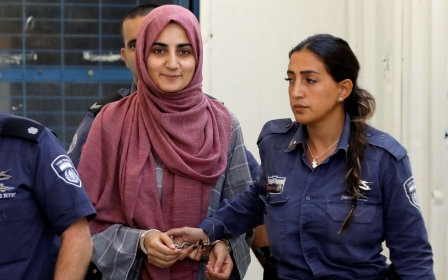Islam takes backseat in Kosovo politics as country pushes for EU membership
PRISTINA, Kosovo – Former US presidents are seldom venerated on the streets of Karachi or Cairo. The tiny Balkan breakaway region of Kosovo, however, stands out as a rare pocket of the Muslim world where American leaders of yesteryear are revered.
Its capital, Pristina, lionises the Arkansas statesman Bill Clinton with a 3.5-metre statue, his left hand outstretched and flashing a smile across a drab, Soviet-era plaza. Odder still, the beaming bronze stands only 1km from the corner with George Bush Street.
Striped American flags are still seen flapping in the breeze across Kosovo, 19 years after NATO military operations halted Serbian massacres and other atrocities there, and 10 years after the mostly Muslim province declared it was splitting from Belgrade.
I’m Albanian. I’m not Muslim. Religion is not my first identity
- Ramush Haradinaj, Kosovo PM
Speaking with Middle East Eye and other news outlets from his airy office in Pristina, Prime Minister Ramush Haradinaj stressed that Kosovars inhabit "another world" than their Muslim brethren in the nearby Middle East.
"We are a Euro-Atlantic nation. When we were in trouble, the US and NATO [were] with us, so we belong to this club," said Haradinaj, who still walks with the swagger of a Kosovo Liberation Army (KLA) hero from its 1998-99 battle for survival against attacking Serb-led Yugoslav forces.
"I’m Albanian. I’m not Muslim. Religion is not my first identity. The truth is we’ve existed for more than 2,000 years, before even Mohammed or Jesus. We have a memory, we know who we are, we lived as Christians for very long and we adopted the Muslim religion through the Ottoman administration."
For such comments, Kosovo bucks the trend of many Muslim-majority countries.
While more than 90 percent of the country’s 1.8 million people are Kosovar Albanian and Muslim, secular institutions are cherished, mosques are less ostentatious than those in parts of the Middle East, and there is less appetite for Islamic law.
By one analysis, this is more than just a cultural trope. As Kosovars aspire for membership of NATO and the European Union (EU), they may be playing down an Islamic identity to ease their way into a club of countries with Christian roots.
Turkey’s experience may be instructive. Ankara and the EU opened membership talks in 2005, but negotiations have ground to a halt as the mostly Muslim nation of 81 million people is "moving further away" from the bloc, according to a recent EU report.
For some Muslim rights advocates, this reinforces an idea that the EU and some of its members are hostile to Islam and do not want millions of Muslims from Turkey, Kosovo and other parts of the Balkans joining the bloc.
They point to a WikiLeaks cable from 2004 in which Cardinal Ratzinger, who soon became Pope Benedict XVI, spoke out against letting a Muslim state join the EU and pressed for its constitution to mention Europe’s "Christian roots".
Vessela Tcherneva, a Bulgaria-based analyst for the European Council on Foreign Relations, a think-tank, acknowledged the anti-immigrant rhetoric from rabble-rousers across Europe, but said this is outside mainstream EU politics.
Tcherneva pointed to EU-member Bulgaria’s centuries-old Muslim minority, France’s substantial Muslim population and German Chancellor Angela Merkel opening the doors to Syrians, Afghans and others during the 2015 refugee crisis.
"Europe can deal with that," Tcherneva told MEE. Religion is only a sideshow to EU principles, which are focused on advancing "liberal democracy where everyone is equal in front of law" regardless of faith, she added.
That’s why Kosovo could be a good fit for the Euro-club, she added. The partially recognised, landlocked, mountainous republic is already hardwired with secular institutions.
"Religion has never been a really strong feature there; it has always been an atheists’ state. There are some renewed attempts to bring back religion to the Muslim communities across the Balkans, but it’s not a decisive factor," Tcherneva told MEE.
Kosovo has bigger obstacles in the way of European integration than religion, she added. Pristina has been recognised by 115 governments, including 23 out of 28 EU members, but its membership in the United Nations is being blocked by Serbia's allies Russia and China.
Albania, Bosnia, Kosovo, Macedonia, Montenegro and Serbia all hope to join the EU. Membership talks are underway with Serbia and Montenegro: Belgrade must strike a deal with Kosovo, its breakaway province, if it wants to join by the 2025 target date.
While Brussels pressures Serbia to accommodate Kosovo’s independence, it similarly nudges Pristina to fight corruption and cronyism, prosecute alleged KLA war criminals and to protect the Serb minority, as much as 4 percent of the population.
For Miodrag Milicevic, executive director of Aktiv, which lobbies for Serb rights from a base in the divided northern city of Mitrovica, tensions between Serbs and Kosovar Albanians are the country’s biggest threat.
In a recent opinion survey of northern Kosovo areas with Serb populations, 90 percent of respondents said the country was moving in a bad direction, and almost half expected to relocate abroad within the next five years.
While religion reinforces divisions, the populations are far more riven by national identities, wartime atrocities and perceived grievances than by tensions between Islam and the Serbian Orthodox Church, Milicevic said.
"In this kind of fragile and unstable environment, you don’t feel yourself building up your future, you feel that after so many years of the situation not getting any better, more like migrating than staying in Kosovo," Milicevic told MEE.
"If you’re losing half your citizens from the north of Kosovo, this is near to a disaster."
This article is available in French on Middle East Eye French edition.
Middle East Eye propose une couverture et une analyse indépendantes et incomparables du Moyen-Orient, de l’Afrique du Nord et d’autres régions du monde. Pour en savoir plus sur la reprise de ce contenu et les frais qui s’appliquent, veuillez remplir ce formulaire [en anglais]. Pour en savoir plus sur MEE, cliquez ici [en anglais].





